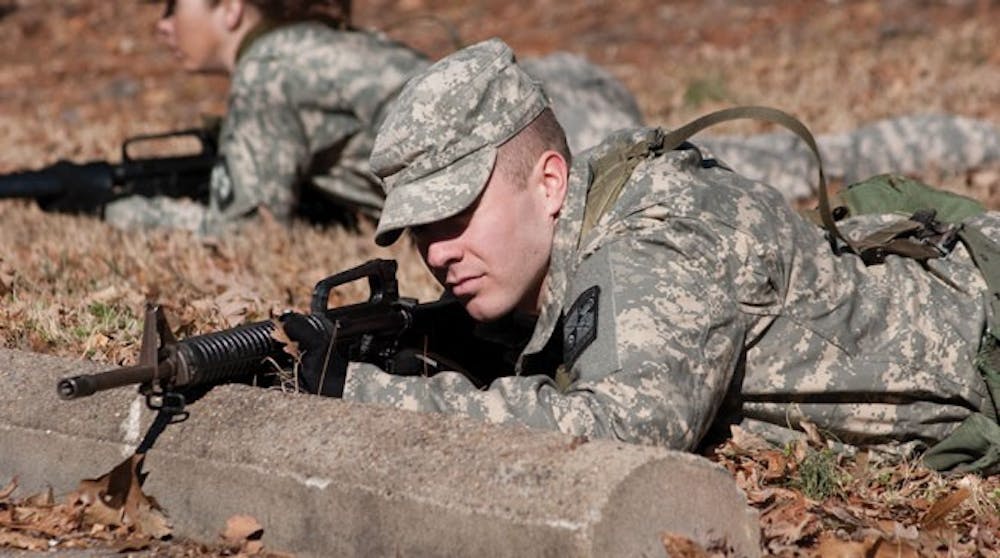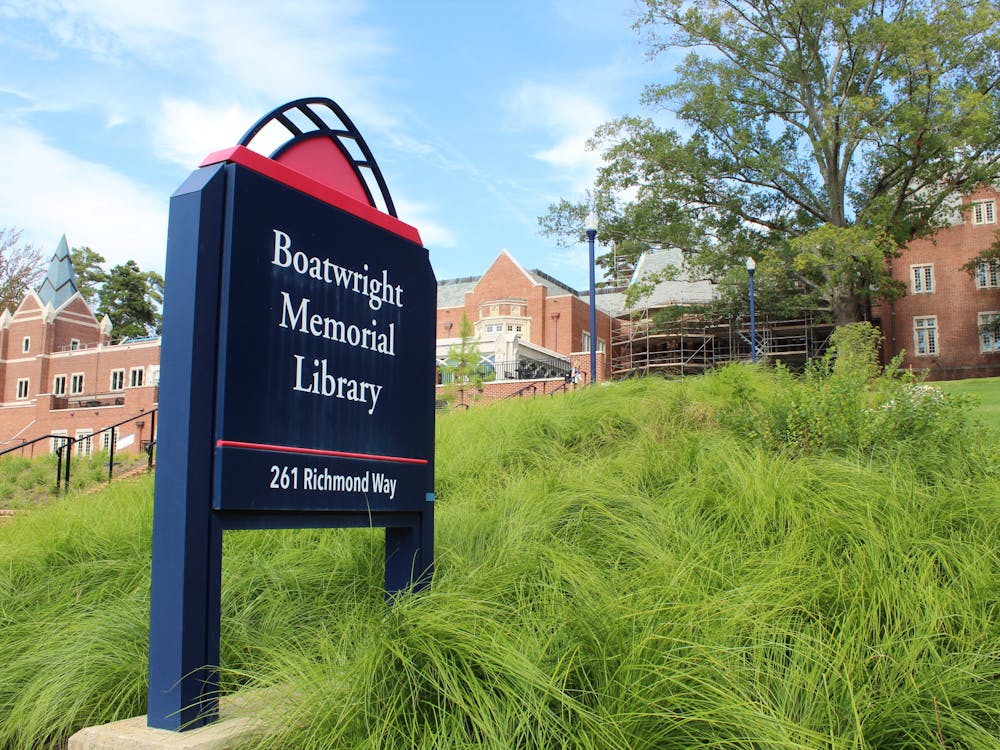While most of the University of Richmond's students were asleep at 6:45 a.m. last Saturday, the Reserve Officers' Training Corps cadets were already 15 minutes into their three-mile morning run.
The cadets chanted as they ran, their voices echoing across campus.
"I was trying to wake some people up," freshman cadet Patrick Coughlin said. "If we were going to be up that early, I wanted people to be awake with us."
The run was the first of the events in the Spider Battalion's Leadership Lab Day. These days are held on Richmond's campus once a semester and provide training exercises for the cadets, preparing them to be U.S. Army officers.
The Spider Battalion comprises 76 contracted cadets from Richmond, Virginia Commonwealth University, Randolph-Macon College, Longwood University and Hampden-Sydney College. Of the 76 cadets, 20 are Richmond students.
By about 7:45 a.m., the cadets had changed into their fatigues and gathered in Milhiser Gymnasium. A single light in the middle of the ceiling provided some illumination as the young men and women prepared for the day ahead.
They checked and double-checked their 30-pound rucksacks and filled their canteens. A few opened a Meal, Ready-to-Eat, or MRE, and downed some breakfast. MREs are light brown plastic pouches containing precooked foods and snacks.
The menu "depends on which bag you get," said Josh Williams, a senior cadet from VCU. One menu included a beef patty and wheat snacks while another contained spicy penne pasta with vegetarian sausage and dried fruit. Each MRE contains about 1,250 calories and is designed to withstand parachute drops and keep soldiers alert and energized in combat zones.
After the cadets were fed and had their gear in order, they marched to Jepson Hall for an awards ceremony. Andrew Deel, a Richmond senior cadet, stood at the front of the room and addressed the standing cadets.
"Take seats!" he shouted.
"Leadership!" the cadets shouted back in unison before sitting down.
Eight cadets received awards for their scores on the Army Physical Fitness Test, and 10 other cadets were recognized for their academic achievements.
Enjoy what you're reading?
Signup for our newsletter
The senior cadets were also recognized for the Army branches they will join after graduation. The fifteen seniors will become junior officers in branches ranging from Military Police and Aviation to Medical Services and Finance.
Finally, Lt. Col. Richard D. Gillem Jr., the Spider Battalion Commander, swore in two new cadets, and then addressed his Battalion.
"If you want to be a good leader, you have to be a good follower," he said. "And if you want to be a good follower, you have to be competent in your skills."
Skills competence was the Battalion's main objective on Saturday. After the awards ceremony, some of the seniors marched the freshmen and sophomore cadets over to the lacrosse field next to the Jepson Alumni Center. There, they would spend their day receiving basic training.
The day was cold but sunny, and once the morning frost had thawed, the field made for some muddy terrain. The freshmen and sophomore training site contained five stations with senior-cadet instructors: hand and arm signals, proper execution of an ambush, how to react to mortar or sniper fire, squad and team leader responsibilities, and drill and ceremony. The first- and second-year cadets were divided into groups and rotated through the stations.
Deel, while waiting to instruct cadets on ambush execution, watched another group of cadets practicing their marching technique at the drill and ceremony station.
"We've got to get the basics down before we can do all kinds of fun stuff," he said.
While the freshmen and sophomore cadets received their basic training, the junior cadets were in the woods by the campus' main entrance. Their training was "tactical at the higher level," Gillem said. They went over things they would need to know if they were a squad leader, "in charge of 10 to 20 people," he said.
The juniors were instructed on basic medical training, how to safely capture and search a prisoner of war, how to deal with civilians and the media in combat zones and the basics of artillery support.
The senior cadets coordinated the day's activities, devising schedules and presentations for the younger cadets' training sites. It was a real-world leadership opportunity for them, Gillem said. "They've been planning this operation for a month," he said. "You can't lead by e-mail; you lead by example.
"A good lieutenant can pull it out of their ass at the last minute," Gillem said. "A great lieutenant doesn't have to."
Around 11 a.m., the freshmen and sophomores' training was briefly interrupted and they had to clear the lacrosse field. A UH-60 Black Hawk helicopter thundered in, circled the area and landed on the grass next to field.
If the cadets' running and chanting hadn't interrupted students' Saturday morning slumber, the roar of the monstrous aircraft certainly did. Trees bent from the rotor wash as the sleek green machine set down, and the bleachers on the lacrosse field were blown into the woods as if they were leaves.
"It woke me up," said sophomore James Hahn, who lives in Gray Court. "I don't sleep very late so I didn't mind, but I remember hearing it when I opened my eyes."
Once the helicopter had landed, the cadets practiced loading troops and equipment onto and off of the aircraft. The Black Hawk is capable of carrying 11 fully equipped soldiers and a Humvee strapped to the bottom, Gillem said.
Throughout the day, curious pedestrians stopped by to look at the helicopter. Families walking dogs pulled out their camera phones and snapped pictures. University students emerged from their dormitories to get a look.
At 2 p.m., after the cadets had successfully completed their static load training, Gillem accompanied President Edward Ayers and Provost Stephen Allred on a brief ride in the Black Hawk. The aircraft circled campus three times, giving the men a bird's-eye view of campus. It also flew along the James River to demonstrate the machine's capabilities. The Black Hawk reached 160 knots, or approximately 184 mph, while rocketing over the river, and banked at 60 degrees when ready to return to campus.
The cadets finished their day in the company of Maj. Gen. Gina S. Farrisee. Farrisee is a Richmond alumnus, a former Spider Battalion cadet, and was commissioned through the Richmond ROTC program. She lectured the cadets about life as a new Army lieutenant and the lessons they would learn.
"You are given the responsibility of the lives of the soldiers who are working for you," she said. "Know your soldiers, and know their issues and if there's something that you can do."
Although she talked at length about the responsibilities of an officer, she also stressed the friendships one can make in the Army, calling it a "family." When Farrisee was done talking, she sat in on a panel of Army officers, all of them former Spider Battalion Cadets, who answered any questions the cadets had.
No matter what has been going on in politics, Richmond's ROTC program has seen consistent and healthy numbers of students who have wanted to participate, Gillem said. The program welcomed 19 students on scholarships last year, he said.
The students are selfless, physically fit and have strong values, he said.
"You're not going to do four years in ROTC and four years in the Army just for the money," he said.
The Spider Battalion was named the No. 1 ROTC program in the North Carolina and Richmond Brigade last year. Richmond is also one of five schools recognized by the U.S. Army Cadet Command for having met its ROTC officer commissioning numbers every year since 2000.
Contact reporter Guv Callahan at guv.callahan@richmond.edu
Support independent student media
You can make a tax-deductible donation by clicking the button below, which takes you to our secure PayPal account. The page is set up to receive contributions in whatever amount you designate. We look forward to using the money we raise to further our mission of providing honest and accurate information to students, faculty, staff, alumni and others in the general public.
Donate Now



